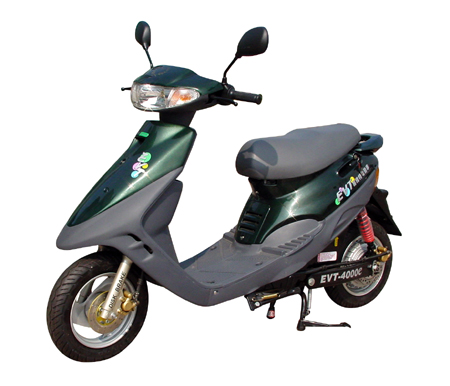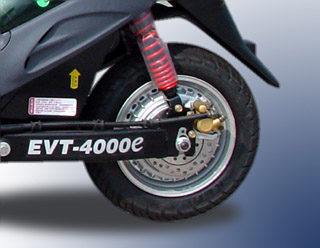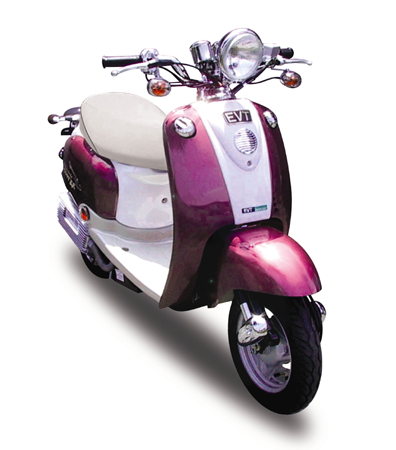Rising Fuel Prices Pave Road in Taiwan for Electric Scooters
2008/10/20 | By Quincy Liang | EVT TECHNOLOGY CO., LTD."The electric scooter is in fact an electronic product, and Taiwan is the world's most competitive producer of electronic products." This observation comes from Hawke Tien, deputy general manager of the EVT Technology Co., Taiwan's biggest maker of electric scooters.
EVT is a member of the local Chroma Group, a supplier of high-end power-supply testing equipment for high-tech industries. In addition to being Taiwan's top manufacturer of electric scooters, EVT (whose vehicles are the only ones to have passed the necessary standards certification and are used by government agencies and technology parks around the island) also exports more of them to Europe and the United States than any other domestic company.
"A favorable environment for the electric scooter has arrived, and faster than we expected," Tien comments. "The era of low gasoline prices is gone, making way for vehicles using alternative energy, and no other such vehicles can compare to electric scooters."
Thanks to advances in battery technology, Tien explains, the electric scooter is now in a better position to replace gasoline-powered two-wheelers. The focus in battery development is on lithium models, which are more compact and can last through five times as many recharging cycles as most lead-acid batteries. Battery scooters have zero emissions and are almost maintenance-free, and are exempt from fuel taxes.
Tien praises the Chroma Group for giving his company strong financial backing as well as the finest support in the fields of technology and key-parts supply.
EVT ships its scooters to North America and Europe, and expects to start selling them to Sweden's postal service after overcoming challenges to batteries, motors, and control units posed by the continuous stop-and-go demands of postal delivery.
Tien is confident that his firm can overcome these challenges, saying, "Only companies with in-house R&D capability can survive in the electric-scooter market, at least right now. Mere assemblers do not have the ability to upgrade or modify their vehicles to meet rapidly changing market trends, customer requirements, and technological advancements. One significant factor for us is that a large part of Taiwan's talented electric-scooter R&D professionals are at EVT."
Great Opportunities
"Very few places are as well positioned as Taiwan for the further development of the electric scooter industry," Tien goes on, "thanks to our powerful advantages in this line."
First of all, Tien notes, Taiwan has long been a major producer of powered two-wheelers (PTWs). Its large domestic market (800,000 to 1 million units annually) provides a sound environment for the development of electric scooters, which share many parts with their gasoline-powered counterparts.
Second, Taiwan is a high-tech stronghold with an abundance of R&D professionals in fields related to electric scooters: electronic control, batteries, motors, and electrical machinery, among others. This makes the island an ideal one-stop-R&D shop for electric-scooter development.


Third, more and more local companies are becoming involved in the battery business, thanks to the vigorous development of the island's information technology (IT) industry; and battery makers are now looking for new applications for their products, especially in the transportation industry. "In terms of technology and quality, Taiwan-made batteries match or even outstrip international standards," Tien claims. He expects a group of local battery makers to introduce new lithium-ion batteries suitable for use in electric scooters next year, and believes that these will quickly replace lead-acid batteries.
Fourth, Taiwan has one of the world's most comprehensive supply chains for high-quality PTW parts, and local producers already make key parts for many major international PTW brands. Further, Tien notes, these local producers have strong innovation capability and are able to supply the parts that the island's electric-scooter makers need to differentiate their products and their brands.
Doing What Is Right
"EVT always insists on doing what is right," Tien boasts. "That's why we insisted from the very beginning on the adoption of brushless hub-motor technology, which offers an almost total lack of transmission loss thanks to a unique design that also reduces noise and boosts power efficiency."
The digital intelligent controller system that EVT developed itself provides numerous advanced functions such as protection from over-heating (cutting power in half or even shutting it down completely when the temperatures reaches its set ceiling), protection from an excessive supply of electricity, superior battery energy management (a warning beep sounds when the battery falls to 10% charge), dual (powerful/economic) driving modes, and power cut-off during braking for safety purposes (with power-return half a second after the brakes are released).

EVT currently offers three electric-scooter models, two with two wheels and one with three. With a conventional lead-acid battery pack, Tien reports, his vehicles have an average range of 45 to 60 kilometers (or 90 km at a fixed speed of 30 kph). Recharging a fully depleted battery takes four to 6.5 hours.
His company will continue to consolidate its No. 1 position in Taiwan's electric-scooter industry, Tien says, by constantly introducing newer and better models with advanced battery solutions.




